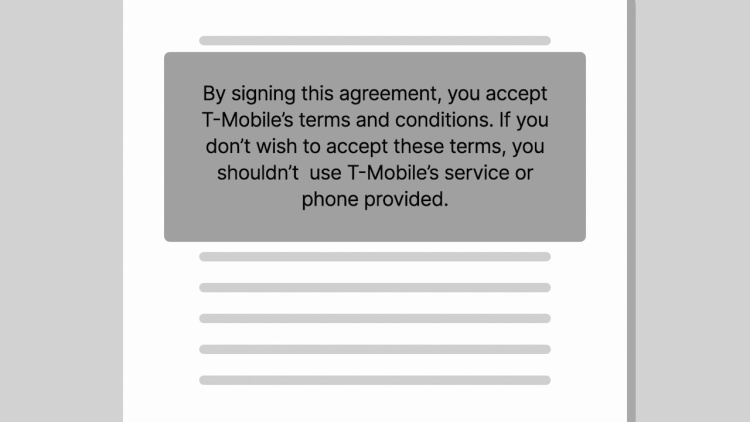Gatton v. T-Mobile USA, Inc.
California Court of Appeal
152 Cal. App. 4th 571 (2007)
- Written by Sarah Larkin, JD
Facts
T-Mobile USA, Inc. (T-Mobile) (defendant) provides cellular phone service. Its subscribers (plaintiffs), of which Gatton is one, are all required to sign a service agreement. The service agreement provides that subscribers are bound by T-Mobile’s Terms and Conditions (Terms). It also provides that all disputes are required to be arbitrated as provided in the Terms. The introductory paragraph in the Terms provides, in all capital letters, that subscribers agree to be bound by the agreement. It also provides that if a subscriber does not wish to be bound, he should not use T-Mobile’s service or the phone. The shipping box for the phone was sealed with sticker reminding the subscriber to read the Terms and that he agreed to be bound by them, including the arbitration agreement, if he used the service. A “Welcome Guide” included in the phone shipping box also provided the Terms. The arbitration clause in the Terms provided that arbitration was mandatory and class arbitration was not permitted. Gatton and other subscribers brought suit on behalf of themselves and others similarly situated challenging certain provisions of the Terms. T-Mobile moved to compel arbitration based upon the arbitration clause in the contract. The trial court denied the motion, holding that the arbitration clause was unconscionable because it denied class arbitration. T-Mobile appealed to the Court of Appeals of California.
Rule of Law
Issue
Holding and Reasoning (Gemello, J.)
Concurrence/Dissent (Jones, J.)
What to do next…
Here's why 907,000 law students have relied on our case briefs:
- Written by law professors and practitioners, not other law students. 47,100 briefs, keyed to 996 casebooks. Top-notch customer support.
- The right amount of information, includes the facts, issues, rule of law, holding and reasoning, and any concurrences and dissents.
- Access in your classes, works on your mobile and tablet. Massive library of related video lessons and high quality multiple-choice questions.
- Easy to use, uniform format for every case brief. Written in plain English, not in legalese. Our briefs summarize and simplify; they don’t just repeat the court’s language.





